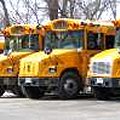- By Dan Veaner
- News
 Print
Print  First we thought we were going to have to cut over a million dollars. Then we had over a million in reserves due, in part, to a federal stimulus infusion. Now we could be faced with mid-year spending cuts. The roller coaster ride the Lansing Central School District and districts across the state has been on is on a peak and ready to plummet down the state aid track. How far down it will go is uncertain, but Lansing Superintendent Stephen Grimm gave the Lansing Board of Education a glimpse of how mid-year state aid cuts might negatively impact the district.
First we thought we were going to have to cut over a million dollars. Then we had over a million in reserves due, in part, to a federal stimulus infusion. Now we could be faced with mid-year spending cuts. The roller coaster ride the Lansing Central School District and districts across the state has been on is on a peak and ready to plummet down the state aid track. How far down it will go is uncertain, but Lansing Superintendent Stephen Grimm gave the Lansing Board of Education a glimpse of how mid-year state aid cuts might negatively impact the district."We could potentially lose $750,000 and a mid-year cut of $500,000," Grimm said. "That's a worst-case scenario. That's over $1.2 million, which is more than our unappropriated fund balance, which we should retain moving into the next budget cycle anyway."
The cuts are part of Governor David Patterson's attempt to make up for a $3 billion shortfall in state funding. If his plan is passed school aid will be cut by $686 million for the remainder of the current school year, with wealthier districts being hit hardest. Hundreds of state programs face similar cuts, but school aid is a particularly hot potato because of its direct impact on property taxpayers.
Grimm was vague about how the district will handle the cuts if they come.

Stephen Grimm
Grimm says that district officials have done a good job of containing costs that they have power over. He says operating costs only rose 3.6% from last year. But cost rises outside of the district's control are rising in double digit increments. Teacher and staff retirement plans are rising in double digits, and current employee health insurance is expected to rise almost 10% next year.
School Board member David Ditman remarked that because the effect of the economic downturn has been less in Tompkins County than in most other counties in the state that Lansing could suffer more cuts than it otherwise would have. He says steady property values in this county will hurt us relative to communities with falling property values.
"There is a double-whammy," he said. "Property values on Long Island are falling. Those school systems are what they call the 'high-value' school systems. As they fall we will move up in the current wealth ratio, which will then make us eligible for less State aid. As they fall the average shifts to the right. If we stay the same we will then become a 'more wealthy' school district and qualify for less aid, even in the future. It's all relative to what happens in the state. The rich people down in Long Island end up losing value and we end up getting hurt."
"The federal stimulus money that was originally for deficit reduction, which was going to take $750,000 away from us for this year," Grimm said. "The federal stimulus money saved us for two years. Year three is going to be coming up."
Grimm says that school administrators across the state are trying 'not to scare, but to prepare.' He noted that it is early and that the school aid cuts are likely to face opposition in the state legislature. He warned that there will probably be cuts that will impact the district for years to come, and said that activist school officials and school boards could influence the budget vote.
"Anything we can do to put pressure on the legislators," he said. "The superintendents are working on some things, BOCES is working on some things, and school boards are as well."
----
v5i45



